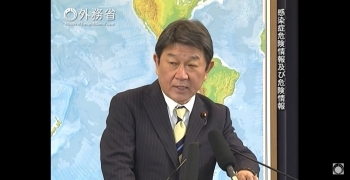Press Conferences
Press Conference by Foreign Minister MOTEGI Toshimitsu
Friday, June 18, 2021, 10:45 a.m. Ministry of Foreign Affairs
Japanese
Opening Remarks
End of the Ordinary Session of the Diet
Mr. MOTEGI Toshimitsu, Minister for Foreign Affairs: The ordinary session of the Diet ended the day before yesterday. The ordinary session of the Diet began with deliberations on the third supplementary budget. The FY2021 budget is the highest ever at 106.6097 trillion yen, and was approved within the fiscal year.
A total of 62 out of 64 bills, including continuing items, that were submitted to the Diet were approved. This was an approval rate of 96.8%, the highest in the past five years of ordinary Diet sessions.
In regard to MOFA, all of our 12 bills and agreements were approved, including the Protocol Amending the Special Measures Agreement (SMA) on Host Nation Support (HNS) and the Regional Comprehensive Economic Partnership (RCEP).
I believe that this ordinary session of the Diet was very fruitful. I am grateful for the cooperation. That is all from me.
Arrest of the Executives of the Apple Daily in Hong Kong
Asahi Shimbun, Sato: Yesterday, five executive members of the media group that publishes the Apple Daily newspaper in Hong Kong, which is critical of the Government of China, were arrested by police on allegations that they violated the Hong Kong National Security Law. This can be considered a further threat to freedom of the press in Hong Kong. Please tell us your view and how the Government of Japan will respond going forward.
Minister Motegi: As I have repeatedly stated in regard to Japan’s recognition of the recent situation in Hong Kong, Japan’s serious concerns are growing about the effects of the series of incidents thus far, including the one you mentioned, on freedom of speech and freedom of the press, which have been the foundation of the democratic, stable development that Hong Kong has enjoyed.
Hong Kong is an extremely important partner for Japan with which Japan maintains close economic ties and people-to-people exchanges. It is the long-standing position of Japan to attach great importance to upholding the free and open system which Hong Kong has been enjoying and the democratic and stable development of Hong Kong under the ‘One Country, Two Systems’ framework.
The Carbis Bay G7 Summit Communiqué clearly calls on China to respect the rights, freedoms, and high degree of autonomy for Hong Kong enshrined in the Sino-British Joint Declaration and the Basic Law. I believe it is important for the international community to continue to closely cooperate to strongly call on China for this. Japan has directly urged China on this through now, and we will continue to appropriately respond.
North Korea’s Policy on the United States
NHK, Yamamoto: I would like to ask about North Korea. General Secretary Kim Jong-un of North Korea attended the Central Committee of the Workers’ Party of Korea, and stated that North Korea “must prepare for both dialogue and confrontation” with the United States. He mentioned both dialogue and confrontation. What is your assessment of this? Also, how do Japan, the United States, and the Republic of Korea (ROK), as well as Japan and the ROK, plan to respond to this going forward?
Minister Motegi: This is not an especially surprising statement. We are regularly conducting information-gathering and analysis with great interest on the movements concerning North Korea, including this recent statement by Chairman Kim. We have received various information about this matter.
Regarding the United States’ policy review, the current situation is that North Korea has no response when questioned. Japan believes it is important to continue to have Japan-U.S. cooperation as well as Japan-U.S.-ROK cooperation for advancing policies on North Korea based on the results of the United States’ policy review. We held the Japan-U.S.-ROK Foreign Ministers’ Meeting during the recent G7 Foreign Ministers’ Meeting, and we will continue to exert all efforts for necessary information gathering and analysis.
Foreign Policy on Iran After the Presidential Election
Pan Orient News, Azhari: I would like to ask about the Middle East. The Iranian elections is around the corner. We know that Japan doesn't usually comment on elections of other countries, but what is Japan's policy towards Iran for the near and medium future? Especially regarding the crossfire between Yemen and Saudi Arabia because that might need attention.
PMinister Motegi: I would like to refrain from commenting on the results of elections in countries, which is of course not limited to Iran. Japan has been monitoring Iran’s presidential election. No matter which candidate wins the election, we will work to further strengthen bilateral relations with Iran. You mentioned the armed conflict that has occurred between neighboring countries of Iran. We will continue our active diplomatic efforts toward easing tensions and stabilizing the situation in the Middle East, utilizing our traditionally friendly relations with Iran.
There is also the nuclear issue in regard to Iran. Dialogue is currently being conducted among related countries in Vienna concerning Iran’s nuclear issue, and the United States and Iran are both progressing toward returning to the Joint Comprehensive Plan of Action (JCPOA). Japan hopes that both countries will progress toward returning to the JCPOA and is monitoring the consultations.


